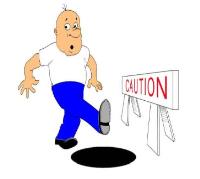 Add My Company
Add My Company
Sign In
Why Record and Report Accidents?
09-08-2016

Accident reporting
An accident is an unplanned event that results in injury, damage to property or some other loss. The law requires that certain work-related accidents are reported to the local authority or the Health and Safety Executive under RIDDOR Legislation.
All accidents to employees, however minor, should be recorded. This is a requirement under social security legislation; although reporting and recording procedures may vary from making an entry into an accident book to completing the online Reporting forms on the HSE website. Employers need to be sure that they satisfy all legal reporting requirements for employees and non-employees, and take measures to monitor accidents.
Have a look at our selection of Accident Books from only £2.25* HERE or by clicking on the image above.
It is important that all accidents are investigated to determine whether existing control measures are adequate, or whether new control measures need to be put in place to prevent a similar accident occurring again in the future. We can supply you with our own Accident Investigation Procedures by clicking HERE
If you have a look at the image below the control measure is the sign saying ‘caution’ this is not an effective control measure as the man has not noticed it, or the hole he is about to fall in!
Check whether your control measures are suitable and sufficient and if there has been an accident investigate why and whether additional control measures should be put into place to manage, or can you eliminate the risk completely?
Records may also have to be produced for the Health and Safety Executive (HSE); under the Reporting of Injuries, Diseases and Dangerous Occurrences Regulations 2013 (RIDDOR), certain accidents that occur must be reported to the Health and Safety Executive or the local authority, whichever is in the circumstances the enforcing authority.
Our Accident Reporting Guidance Poster at only £9.99* can be found HERE or by clicking on the image
Employers must report accidents, if they:
• prevent the injured person from continuing his or her normal work for more than seven consecutive days (excluding the day of the accident); or
• result in death or 'specified injuries' as detailed on the HSE website HERE
In addition to over 7 day accidents and ‘specified injuries’, employers are also required to report certain “Dangerous Occurrence”, a list of which can be found on the HSE website HERE
What are Near Misses?
Near misses are incidents that have a potential for harm but result in no injury, the image below shows that if the pin DOES NOT hit the contractor, then it is classed as a near miss – if it DOES hit the contractor or damage any property it would then result in an accident.
Near Misses, although not part of the legal duties mentioned above, it is also good practice to record and investigate non-reportable 'near-miss' incidents, workplace accidents and occurrences where no-one has actually been hurt or become ill, but where the consequences could have been serious for workers. It is important that you and your employees continually Risk Assess all activities for our Risk Assessment Training Course for all for only £20.00* per candidate click Here or on the image
In this way, it is possible to learn from such incidents so that workers are protected from harm, using the old adage 'prevention is better than cure'.
For more information on Why Record and Report Accidents? talk to Safety Services Direct Ltd
Enquire Now
List your company on FindTheNeedle.

